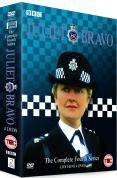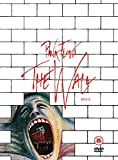![Pink Floyd - The Wall [1982]](/pictures/1013315.jpg) Pink Floyd - The Wall | DVD | (22/04/2005)
from £9.99
| Saving you £-2.00 (N/A%)
| RRP
Pink Floyd - The Wall | DVD | (22/04/2005)
from £9.99
| Saving you £-2.00 (N/A%)
| RRP By any rational measure, Alan Parker's cinematic interpretation of Pink Floyd's The Wall is a glorious failure. Glorious because its imagery is hypnotically striking, frequently resonant and superbly photographed by the gifted cinematographer Peter Biziou. And a failure because the entire exercise is hopelessly dour, loyal to the bleak themes and psychological torment of Roger Waters' great musical opus, and yet utterly devoid of the humour that Waters certainly found in his own material. Any attempt to visualise The Wall would be fraught with artistic danger, and Parker succumbs to his own self-importance, creating a film that's as fascinating as it is flawed. The film is, for better and worse, the fruit of three artists in conflict--Parker indulging himself, and Waters in league with designer Gerald Scarfe, whose brilliant animated sequences suggest that he should have directed and animated this film in its entirety. Fortunately, this clash of talent and ego does not prevent The Wall from being a mesmerising film. Boomtown Rats frontman Bob Geldof (in his screen debut) is a fine choice to play Waters's alter ego--an alienated, "comfortably numb" rock star whose psychosis manifests itself as an emotional (and symbolically physical) wall between himself and the cold, cruel world. Weaving Waters's autobiographical details into his own jumbled vision, Parker ultimately fails to combine a narrative thread with experimental structure. It's a rich, bizarre, and often astonishing film that will continue to draw a following, but the real source of genius remains the music of Roger Waters. --Jeff Shannon
![Pink Floyd - The Wall [1982]](/pictures/1024601.jpg) Pink Floyd - The Wall | DVD | (05/06/2006)
from £12.85
| Saving you £1.14 (8.87%)
| RRP
Pink Floyd - The Wall | DVD | (05/06/2006)
from £12.85
| Saving you £1.14 (8.87%)
| RRP By any rational measure, Alan Parker's cinematic interpretation of Pink Floyd's The Wall is a glorious failure. Glorious because its imagery is hypnotically striking, frequently resonant and superbly photographed by the gifted cinematographer Peter Biziou. And a failure because the entire exercise is hopelessly dour, loyal to the bleak themes and psychological torment of Roger Waters' great musical opus, and yet utterly devoid of the humour that Waters certainly found in his own material. Any attempt to visualise The Wall would be fraught with artistic danger, and Parker succumbs to his own self-importance, creating a film that's as fascinating as it is flawed. The film is, for better and worse, the fruit of three artists in conflict--Parker indulging himself, and Waters in league with designer Gerald Scarfe, whose brilliant animated sequences suggest that he should have directed and animated this film in its entirety. Fortunately, this clash of talent and ego does not prevent The Wall from being a mesmerising film. Boomtown Rats frontman Bob Geldof (in his screen debut) is a fine choice to play Waters's alter ego--an alienated, "comfortably numb" rock star whose psychosis manifests itself as an emotional (and symbolically physical) wall between himself and the cold, cruel world. Weaving Waters's autobiographical details into his own jumbled vision, Parker ultimately fails to combine a narrative thread with experimental structure. It's a rich, bizarre, and often astonishing film that will continue to draw a following, but the real source of genius remains the music of Roger Waters. --Jeff Shannon
 Juliet Bravo - Series 4 | DVD | (22/05/2006)
from £N/A
| Saving you £N/A (N/A%)
| RRP
Juliet Bravo - Series 4 | DVD | (22/05/2006)
from £N/A
| Saving you £N/A (N/A%)
| RRP Inspector Kate Longton (Anna Carteret) takes up the mantel from Inspector Jean Darblay (Stephanie Turner) in the fourth series of Juliet Bravo Episodes Comprise: 1.Teamwork 2.Teacher's Pet 3.Retribution 4.Solvent Solution 5.Who's Your Friend 6.Mates 7.Bad Seed 8.Doors 9.Guilt 10.John The Lad 11.Who Says The War Is Over? 12.Off Duty 13.Simple Simon 14.Backtrack
![13 Reasons Why: Season One [DVD]](/pictures/1146936.jpg) 13 Reasons Why: Season One | DVD | (23/04/2018)
from £N/A
| Saving you £N/A (N/A%)
| RRP
13 Reasons Why: Season One | DVD | (23/04/2018)
from £N/A
| Saving you £N/A (N/A%)
| RRP Clay Jensen (Dylan Minnette) returns home from high school to discover a box of cassette tapes, recorded by Hannah Baker (Katherine Langford), his classmate and secret crush, who died by suicide only two weeks before. Hannahs tapes reveal the 13 reasons that led to her untimely death, and the people she felt were responsible. This begins an emotional journey of suspense and heartbreak to uncover the mystery behind Hannahs tragic end. Based on the best-selling mystery by author Jay Asher and executive produced by Oscar winner Tom McCarthy, Pulitzer Prize winner Brian Yorkey, Selena Gomez, Kristel Laiblin, Mandy Teefey, and Anonymous Contents Steven Golin, Joy Gorman Wettels and Michael Sugar, this powerful drama also features Kate Walsh, Christian Navarro, Alisha Boe and Brandon Flynn.SPECIAL FEATURES:Hannah & Clay: An Unfinished Love StoryJustin Foley: Not Your Typical JockDiscovering Jessica DavisBringing the Book to Life13 Things About MeBeyond the Reasons "
 Pink Floyd the Wall | DVD | (25/01/2005)
from £N/A
| Saving you £N/A (N/A%)
| RRP
Pink Floyd the Wall | DVD | (25/01/2005)
from £N/A
| Saving you £N/A (N/A%)
| RRP ![Like It Is [1998]](/pictures/1020482.jpg) Like It Is | DVD | (11/09/2000)
from £12.70
| Saving you £2.29 (18.03%)
| RRP
Like It Is | DVD | (11/09/2000)
from £12.70
| Saving you £2.29 (18.03%)
| RRP Like It Is is much like watching a train wreck--the very idea of it is repellent and yet you perversely can't avert your eyes. While its urban grittiness and sooty veneer entranced some critics who mistook its violent, netherworld neorealism for art, Like It Is offers little in the way of redemption, positive gay imaging or even particularly good narrative. Paul Oremland directed this venture about a young, gay Blackpool tough named Craig (Steve Bell) who bare-knuckle boxes for money. He ultimately moves to London in search of a better life and falls in with the trendy London gay-club scene, meeting and falling for a handsome record producer named Matt (Ian Rose) and his wealthy boss (played by the Who's lead singer Roger Daltrey). The better life is quickly tainted by disillusion and misery, much as is the viewing experience. Steve Bell is, in real life, a featherweight boxing champion in Britain and therefore brings an urgent and raw vitality to the lead, but the characters as a whole are either irritating or unsympathetic, and it's ultimately difficult to find anyone to care for, or a story worth empathising with. --Paula Nechak, Amazon.com
![Pink Floyd - The Wall [1982]](/pictures/1012465.jpg) Pink Floyd - The Wall | DVD | (02/06/2003)
from £N/A
| Saving you £N/A (N/A%)
| RRP
Pink Floyd - The Wall | DVD | (02/06/2003)
from £N/A
| Saving you £N/A (N/A%)
| RRP By any rational measure, Alan Parker's cinematic interpretation of Pink Floyd's The Wall is a glorious failure. Glorious because its imagery is hypnotically striking, frequently resonant and superbly photographed by the gifted cinematographer Peter Biziou. And a failure because the entire exercise is hopelessly dour, loyal to the bleak themes and psychological torment of Roger Waters' great musical opus, and yet utterly devoid of the humour that Waters certainly found in his own material. Any attempt to visualise The Wall would be fraught with artistic danger, and Parker succumbs to his own self-importance, creating a film that's as fascinating as it is flawed. The film is, for better and worse, the fruit of three artists in conflict--Parker indulging himself, and Waters in league with designer Gerald Scarfe, whose brilliant animated sequences suggest that he should have directed and animated this film in its entirety. Fortunately, this clash of talent and ego does not prevent The Wall from being a mesmerising film. Boomtown Rats frontman Bob Geldof (in his screen debut) is a fine choice to play Waters's alter ego--an alienated, "comfortably numb" rock star whose psychosis manifests itself as an emotional (and symbolically physical) wall between himself and the cold, cruel world. Weaving Waters's autobiographical details into his own jumbled vision, Parker ultimately fails to combine a narrative thread with experimental structure. It's a rich, bizarre, and often astonishing film that will continue to draw a following, but the real source of genius remains the music of Roger Waters. --Jeff Shannon

Please wait. Loading...
This site uses cookies.
More details in our privacy policy